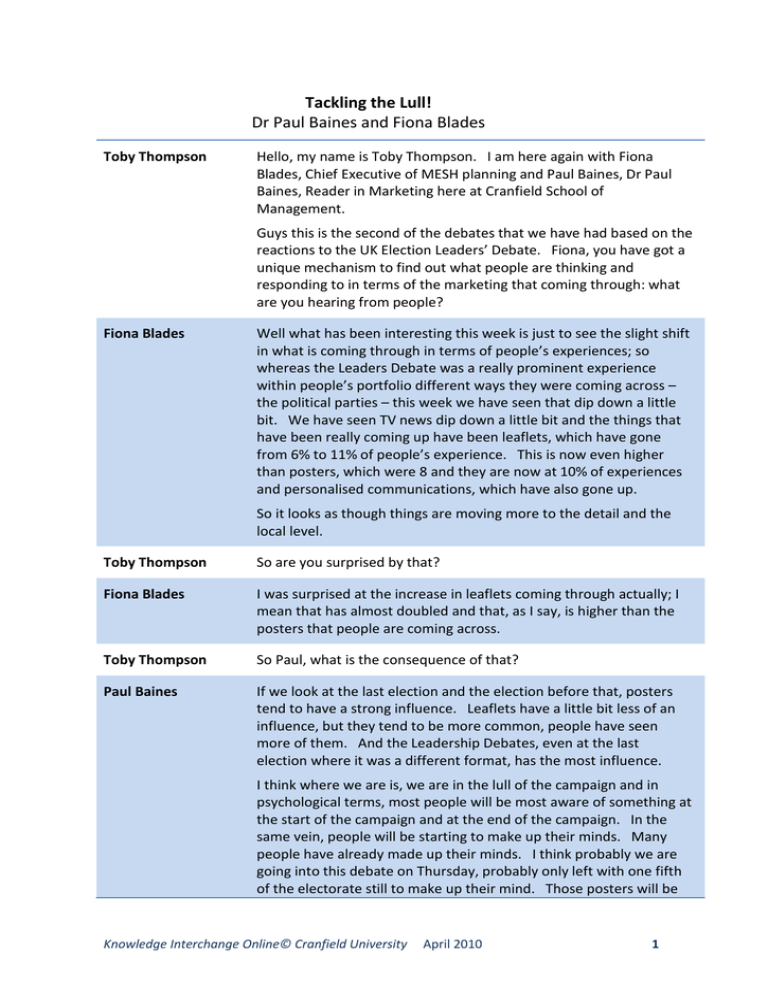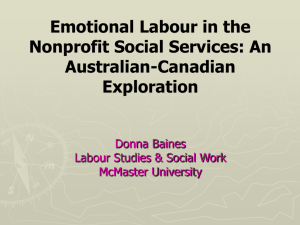Tackling the Lull! Dr Paul Baines and Fiona Blades
advertisement

Tackling the Lull! Dr Paul Baines and Fiona Blades Toby Thompson Hello, my name is Toby Thompson. I am here again with Fiona Blades, Chief Executive of MESH planning and Paul Baines, Dr Paul Baines, Reader in Marketing here at Cranfield School of Management. Guys this is the second of the debates that we have had based on the reactions to the UK Election Leaders’ Debate. Fiona, you have got a unique mechanism to find out what people are thinking and responding to in terms of the marketing that coming through: what are you hearing from people? Fiona Blades Well what has been interesting this week is just to see the slight shift in what is coming through in terms of people’s experiences; so whereas the Leaders Debate was a really prominent experience within people’s portfolio different ways they were coming across – the political parties – this week we have seen that dip down a little bit. We have seen TV news dip down a little bit and the things that have been really coming up have been leaflets, which have gone from 6% to 11% of people’s experience. This is now even higher than posters, which were 8 and they are now at 10% of experiences and personalised communications, which have also gone up. So it looks as though things are moving more to the detail and the local level. Toby Thompson So are you surprised by that? Fiona Blades I was surprised at the increase in leaflets coming through actually; I mean that has almost doubled and that, as I say, is higher than the posters that people are coming across. Toby Thompson So Paul, what is the consequence of that? Paul Baines If we look at the last election and the election before that, posters tend to have a strong influence. Leaflets have a little bit less of an influence, but they tend to be more common, people have seen more of them. And the Leadership Debates, even at the last election where it was a different format, has the most influence. I think where we are is, we are in the lull of the campaign and in psychological terms, most people will be most aware of something at the start of the campaign and at the end of the campaign. In the same vein, people will be starting to make up their minds. Many people have already made up their minds. I think probably we are going into this debate on Thursday, probably only left with one fifth of the electorate still to make up their mind. Those posters will be Knowledge Interchange Online© Cranfield University April 2010 1 Dr Paul Baines having an impact, the leaflets, a bit more of impact because they are more common. This final debate will probably tip most people over the edge. Toby Thompson So from a recency point of view, a primacy recency, the next one is really important? Paul Baines I think the next one is particularly important. The first one was probably the most important, this next one will be very important. The one in the middle, which was probably less decisive will be forgotten about I think on Thursday. Toby Thompson So Fiona, what are people actually saying. In terms of leaflets coming through doors and my local agenda, things that I want to know about – not Westminster, but my road, let’s say outside of my house – what are they saying? Fiona Blades I think that is where some people are finding that the local leaflets are very persuasive. There was a comment from one lady in her diary which actually said that the roads had been improved, education had been improved and she went outside and she said I checked outside and actually that road was better than the one where they hadn’t made those improvements. And those things are having an impact on people because they are thinking well should I support the local person, who has done a good job, or do I think about the national issues. And you can see that coming through in some of the comments that people are saying. Toby Thompson Do you think there is a cause then for parties to have a change to attitude in terms of channels and the way that they talk to the electorate? Paul Baines Oh, I think there is a strong argument for tailoring your communication, not only to the channel, but the time of which that communication goes out and also the nature of who you are speaking to. One thing that is interesting is that the Tories spent quite a lot of money in 2005 using cinema adverts – we haven’t seen or heard anything on the cinema this time around. It is expensive, so I can understand why. And equally, and this is very little known, but the parties could tailor their party election broadcasts to each individual channel. So they could do something different for Channel Four because it has got a slightly different audience demographic, compared to BBC1. Do they do it? No, they don’t do it. Toby Thompson © Cranfield University So in terms of electorate and the people that you are polling, I am intrigued by that. Aren’t you just capturing people that can text very quickly onto their phone, aren’t you just capturing a certain April 2010 2 Dr Paul Baines section of the population of the floating voters? Fiona Blades Well, we have recruited four floating voters from an online panel and obviously that is how many surveys are done nowadays through online panels and we have specifically recruited four of those target audience so that we know they are the floating voters. You don’t have to be able to text quickly because you just have to be able to text four characters: one which describes what the political party is; one which is the actual occasion – so was it a Leaders’ Debate or was it a leaflet. Another one which just says how positive did you feel about this experience – one very negative to five very positive. And a final text which is just and how likely did it make you to vote for this party next time – much more likely to, it made me less likely to. Toby Thompson So it is pretty simply? Fiona Blades Very, very simple and then those texts go into their diary and then they upload comments. So I don’t think that this is any more biased than any of the other ways of doing polling or research. Toby Thompson So Paul, we are looking at maybe a hung Parliament coming up; what is your views on how that pans out? Paul Baines Well, I think the Lib Dems would like it to be a hung Parliament because that gives them some input into some opportunity to wield some power. The Conservatives will certainly want a majority; it maybe that they get one, but it will probably be a small majority. However, it depends on the nature of the vote and how that vote pans out as a result of our first past the post system. So the Lib Dems would really need to increase their vote substantially in order to really increase their seats. But let’s say they get a relatively large number of seats, they will take those seats from the Labour Party very likely because the Labour vote tends to translate from Labour to the Lib Dems rather than directly to the Conservatives. Something like two thirds of the vote in the past, when it has switched, has tended to go from Labour to the Liberal Democrats as a middle ground and I think that is what we will see this time. But the difficulty will be that if there is a hung Parliament, how will this hung Parliament work. If the Liberal Democrats can work with the Conservatives – and I think Clegg can, but I am not sure about the rest of his leadership – then perhaps a hung Parliament would work over the five years. If the Conservatives can’t work with them – and it may be that they can’t – then they would clearly have to go back to the country again for a second election, just like in ’74. Toby Thompson © Cranfield University So Fiona, are you hearing anything about the hung Parliament on the kind of jungle drums that you are listening to? April 2010 3 Dr Paul Baines Fiona Blades Well I think that when I just phoned up the office to get the hot off the press information, what was interesting coming through there on the leaflets was I asked the question is then an issue with Labour knocking Conservatives in the leaflets and actually the comment I got back is I am seeing a few comments about Labour knocking Liberals in the leaflets. So that was coming through, but the Labour leaflets are not persuading people to vote Labour, in fact they are persuading people not to vote Labour. Whereas the Liberal Democrats leaflets that are going out there are persuading people to vote Liberal Democrat. Toby Thompson © Cranfield University Guys, fantastic data. Paul thank you for your analysis and Fiona, thank you too and we will see you very shortly on the next of these debates. April 2010 4


